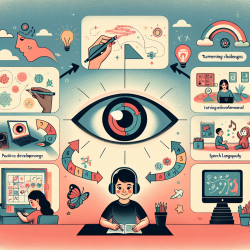Introduction
The COVID-19 pandemic has reshaped numerous industries, including construction, as highlighted in the research article "Impact of Covid-19 on field and office workforce in construction industry." While the construction sector faced unique challenges, the strategies developed to address these issues offer valuable insights for other fields, including online therapy services for children. At TinyEYE, we are committed to leveraging data-driven decisions to improve outcomes for children, and the lessons learned from the construction industry can guide us in enhancing our services.
Understanding the Challenges
The construction industry faced significant challenges during the pandemic, including workplace safety concerns, heavy workloads, and mental health issues among workers. These challenges were categorized into five main areas: organizational, economic, psychological, individual, and moderating factors. The research identified strategies to overcome these challenges, which can be adapted to improve online therapy services for children.
Adapting Strategies for Online Therapy
- Redefining Safety and Environment: Just as construction sites redefined safety protocols, online therapy services can enhance their virtual environments to ensure a safe and engaging space for children. This includes implementing secure platforms, ensuring privacy, and creating a welcoming atmosphere that fosters learning and growth.
- Utilizing Technology: The construction industry embraced technology to maintain productivity. Similarly, online therapy can leverage innovative tools and platforms to deliver effective therapy sessions. Incorporating interactive elements and gamification can make therapy more engaging and enjoyable for children.
- Supporting Mental Health: Addressing mental health concerns was crucial for construction workers. In online therapy, practitioners can focus on supporting children's emotional well-being by incorporating mindfulness techniques and providing resources for parents to support their child's mental health at home.
- Flexible Scheduling: Flexible work schedules helped construction workers manage their workloads. In online therapy, offering flexible session times can accommodate children's varying needs and ensure they receive the support they require without added stress.
- Effective Communication: Clear communication was essential for construction teams. For online therapy, maintaining open lines of communication with parents and caregivers ensures that everyone is informed and involved in the child's progress.
Encouraging Further Research
The construction industry's response to COVID-19 highlights the importance of continuous research and adaptation. For practitioners in online therapy, staying informed about the latest developments and research in child development and therapy techniques is crucial. By embracing a culture of learning and innovation, we can continue to improve our services and outcomes for children.
Conclusion
The challenges faced by the construction industry during the COVID-19 pandemic offer valuable lessons for online therapy services. By adapting strategies such as redefining safety, utilizing technology, supporting mental health, offering flexible scheduling, and maintaining effective communication, we can enhance our services and create better outcomes for children. At TinyEYE, we are committed to using data-driven decisions to ensure every child reaches their full potential.
To read the original research paper, please follow this link: Impact of Covid-19 on field and office workforce in construction industry.










